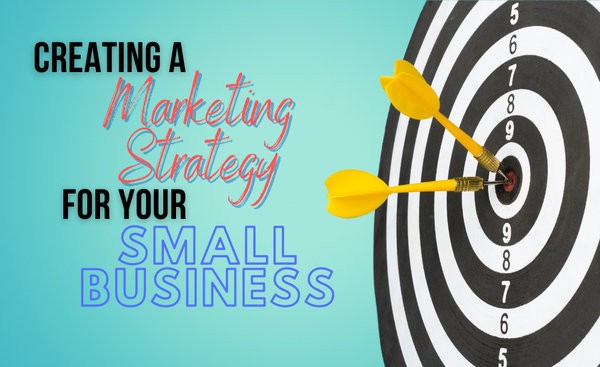Marketing aims to find the correct audience for your products or services. It also allows you to apply the best marketing strategies to attract your desired audience. Luckily, a small business can select from a plethora of promotional strategies to accomplish its objectives. Marketing is what makes you expand your spread of the news for your company and get new clients. But if you’ve never put together a marketing campaign before, it can be hard to know where to start.

Importance of Marketing Strategy
Starting a new business is not a straightforward job because it takes a lot of time and commitment. You need to perfect your offering, choose the best distribution platforms, check your potential buyers, and more. However, no matter how good your brand is, people won’t know about your company until you promote it. Marketing is a crucial part of building your brand and attracting leads and sales for your small business enterprise.
How To Create A Marketing Strategy For Your Business
Here are some of the best marketing strategies that will help you expand your small company in scale and popularity.
1. Identify Your Audience
It is critical to know who you are going to be selling to. Your target demographic varies depending on a variety of factors. That includes your brand niche, location, unique selling proposition(USP), and more. Sometimes, your target demographic can decide the right campaign tactics to be used as part of your small business marketing strategy.
2. Set Your Goals
Define your business and your merchandise. Think of all the strengths and shortcomings of your brand. Write them down so you can review them. List all future market opportunities for your organization or merchandise. That will give you a birds-eye view of your company. It will help you set your goals in your marketing strategy.
Think of your goals as your compass. Later, when you choose marketing strategies, you will equate each approach to the plan. As there are various marketing campaigns out there, it helps to provide some guidance when making tough decisions, such as where to target your business efforts. If your goals and strategies are aligned, apply those tactics to your small business marketing campaign.
3. Set Your Budget
Marketing can be costly. However, you need to be rational on what you will spend on investing in a good marketing campaign. If you do not plan your budget, you will end up paying more than you have projected. Review other companies similar to your niche to have an idea of the amount you will allocate.
While it may be hard to set a considerable amount on your marketing campaign, the return on investment (ROI) is worth it for the right small business marketing strategy. Even if you don’t have a budget to spend on extensive promotional activities, any little bit will help you get your company to the next level.
4. Make Time For Your Plan
You have to determine how much time you can spend on ads every week. It is very tempting to allow your marketing slip when you concentrate on running your company. Therefore, setting a clear target and timeframe would help you keep track of what you will be doing concerning your schedule.
As long as you’re going to work ahead, you will not get tangled with your schedule. If this is the first time you have put together a marketing campaign for your company, you can realize that you will need to make some corrections over time. Don’t flip your campaign strategy every month, but you don’t want to spend all year without taking note of what’s going on and what’s not.
5. Outline Your Plan
To guarantee that your small business marketing strategy is a success, you need to set time-limited business objectives. Make these objectives as practical and precise as possible, both in the short and long term. Your marketing strategy would meet these objectives. Write down the goals so you can calculate the effectiveness of your marketing campaign. Remember, it is easier to regularly take small steps toward your target than to flame out after a few positive weeks.
6. Build Your Website
A company website offers the cornerstone of marketing. It can help target today’s digitally powered customers. A website acts as a business brochure, telling new buyers what you’re doing and why they should buy from you. In addition, the platform acts as a destination for users that look for your brand or product on Google search. You can also make it a landing page for an email marketing strategy or social media tactics.
Therefore, you have to ensure that your website is optimized for search engines. SEO or search engine optimization covers all the technological elements of how your site is designed. It also optimizes your content like video material that you make from video editing software. Your website should load fast and should provide a positive user experience. Failing to have a well-rounded website means that you will miss a massive opportunity in the digital landscape.
7. Enlist In Google My Business
Being in Google My Business (GMB) is one of the most important things you can do with your company. If you run a small company aimed at local customers, it is one of the most effective tactics open to you. If you can land your GMB listing in the top three, you can generate a steady stream of highly qualified leads without spending a dime on advertising.
Google My Business consolidates all of the Google platforms into a single spot, including your Google+ profile, Google Maps profile, Google ratings, data access on Google Analytics and Google Insights, and more.
8. Know Your Reliable Marketing Strategy
Once you’ve established your marketing objectives and who you’re going after, it’s time to figure out what will go into your small business’s marketing strategy. Examine each of your marketing priorities and make a list of the marketing strategies you feel you would need or choose to use to accomplish them.
Determine how your targets will integrate with these strategies and how they work together to shape your overall marketing plan. If you know one of your priorities is to produce more leads, make sure you’re building and posting the appropriate content to generate leads. Plan out just what efforts you’ll be putting forward and which goals they’ll help you accomplish. Incorporating this into your marketing strategy would enable you to determine better how you plan to monitor your efforts’ progress.
Final Thoughts
Creating a marketing campaign can be daunting. However, if given the proper attention, budget, and analysis, it will help you get closer to your objectives. It can be a firm base of your success and help you navigate the business industry’s competitive landscape. Having the right marketing strategy for your small business can achieve your business goals and make your brand stand out in your desired audience.
AUTHOR BIO

MARICAR MORGA
Maricar worked as a marketing professional for almost a decade and handled concerts, events and community service-related activities. Leaving her corporate job for good to pursue her dreams, she has now ventured in the path of content writing and currently writes for Softvire Australia and Softvire New Zealand. A Harry Potter fan, she loves to watch animated series and movies during her spare time.
